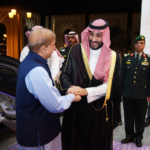BEIJING, Aug 21 (APP):: “Why is the second China-Pakistan Foreign Ministers’ Strategic Dialogue arranged in Hainan province? As we all know, China is building a free trade zone in Hainan, and Pakistan is building a free trade zone in Gwadar.”
It showed that the focus of the second China-Pakistan Foreign Ministers’ Strategic Dialogue was economic and trade cooperation, , visiting professor at Southwest University of Political and Law said on Friday.
Foreign Minister Shah Mahmood Qureshi emphasized that his visit to China would play an important role in further strengthening China-Pakistan “All-Weather Strategic Cooperative Partnership” and deepening strategic communication and coordination between the two countries on a range of issues.
The first round of the China-Pakistan Foreign Ministers’ Strategic Dialogue took place in March 2019, in which both sides vowed to protect the China-Pakistan Economic Corridor from all kinds of threats, Professor Cheng Xizhong wrote in an article published by China Economic Net (CEN).
Terming Pakistan’s economy on a good trend, he said, with close cooperation with China its foreign exchange reserves had increased by 47%.
Prof Chemg said during the five-month lockdown period, Pakistan’s service industry was hit hard, and its exports dropped sharply. “From April to May this year, Pakistan’s exports showed a double-digit decline. However, during the whole pandemic period, Pakistan’s economy has been in a stable developing state, especially the foreign exchange reserves have increased to $12.5 billion.”
During the two years of Prime Minister Imran Khan in office, he said, Pakistan’s fiscal deficit had decreased by $17 billion. In the previous fiscal year, the deficit rate was 8.1%, lower than the expected 9.1%. At the same time, Pakistan’s current account deficit had decreased from about $20 billion to about $3 billion.
He said after the outbreak of the pandemic, Pakistan had significantly reduced imports, thus reducing the pressure on capital outflow from it. Pakistan had also taken further actions to stabilize financial markets. For example, in April, the Pakistani government instructed fuel retailers and refineries to cancel imports and increase domestic procurement to avoid foreign exchange outflow.
“Recently, Pakistan’s exports have rebounded significantly. According to the government data, Pakistan’s total exports in last June reached $1.6 billion, with an increase of 25%, and exports increased by 5.8% in last July.”
Emphasizing that the Chinese investment helped Pakistan’s development, Prof Cheng said, in March this year, Pakistan’s foreign investment increased by 92%.
“In the long run, Pakistan’s fiscal and financial accounts cannot be maintained in such a healthy state without the continuous help of Chinese enterprises,” he said, adding since joining China’s large-scale overseas infrastructure initiative, Pakistan had absorbed a large amount of foreign investment. From 2013 to 2018, Pakistan’s annual foreign direct investment increased from $650 million to $2.2 billion, of which the investment from China accounted for about half of the total.
“A large amount of overseas investment not only promotes the development of local economy, but also improves Pakistan’s hematopoietic capacity.”
In the fiscal year of 2017-2018, he noted that Pakistan’s GDP growth rate reached 5.8%, a record high in 13 years. For example, Pakistan had developed logistics, fishery deep processing, cargo transshipment and other new industries through the development of Gwadar Port, thus opening up new sources of tax revenue.
Prof Cheng said it was worth mentioning that under the pandemic situation, Pakistan’s increasing trend in attracting foreign direct investment remained unchanged. In March, the country attracted $279 million foreign direct investment, with an increase of 92% compared to the same period of the previous year. China continued to be the top direct investment source in Pakistan.
While commenting on effective cooperation in fighting COVID-19, he said, up to now, the number of confirmed cases of COVID-19 in Pakistan had reached 290,000, and China and Pakistan were closely cooperating in the fight against the disease. According to the Wall Street Journal on August 15, a Pakistani government official said that China Pharmaceutical Group was having cooperation with Karachi University to conduct vaccine trials. As part of the cooperation agreement, China would provide Pakistan with enough vaccine in the initial production to cover about one fifth of the Pakistani population.
Since the outbreak of COVID-19, China and Pakistan have effectively cooperated in fighting the pandemic. On August 13, Pakistan received 1,000 ventilators from China. Since the beginning of this year, the Chinese government has successively provided seven batches of anti-pandemic materials to Pakistan, with a total weight of more than 106 tons.






